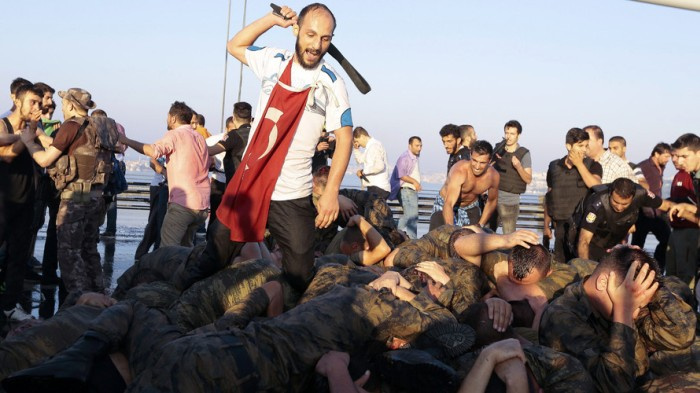Lesser of the Two Evils?: Iranian media slam both Erdogan and the army

It was midnight in Tehran when the first news about coup d’etat in Turkey broke out, or as reported then by Iranian media, “suspicious actions” by Turkish military personnel. Iran’s Foreign Minister Javad Zarif reacted two hours later, 2:15 AM, on Twitter, his main personal outlet. “Deeply concerned about the crisis in Turkey. Stability, democracy & safety of Turkish people are paramount. Unity & prudence are imperative” he twitted. Zarif’s second tweet was more explicity, as the news came out of popular standoff against the putschists: “Turkish people's brave defense of democracy & their elected government proves that coups have no place in our region and are doomed to fail.”
Ali Shamkhani, Secretary of the National Security Council, voiced similar remarks.“We support Turkey's legal government and oppose any type of coup - either [initiated] domestically or supported by foreign sides,” the SNSC Secretary Ali Shamkhani said on Saturday at the end of the council’s meeting” state-run Press TV reported.
Despite their political differences, in their response to the coup attempt in Turkey, Iranian media, once admirers of Erdogan and his style of governance, agreed over two points: the coup had to be denounced, and Erdogan was to be blamed for brining Turkey to this point. After nearly a decade of cordial relations, Tehran and Ankara have entered a phase of tension and rivalry in the recent years, owing to the conflict in Syria. Iran has shown steadfast support for its ally Bashar Assad, while Ankara, despite its hitherto warm relations with Damascus, has been a leading force in calling and pushing for Bashar Assad’s departure. In Iran, the common presumption is that Ankara has been a key supporter of armed terrorist groups, particularly the Islamic State/IS, that are fighting against Syria’s central government.
“Although Turkey is a country of coups, yet the military’s new boldness is the result of the country’s current state of affairs and uncalculated domestic and foreign policies of the president, Recep Tayyip Erdogan” wrote the hardliner Kayhan in its report on the putsch. However, “Muslim masses of Turkey” Kayhan argued, “fear instability, and despise a secular government coming to power through coup d’etat” despite their disillusionment with Erdogan. Kayhan also speculated that the coup may have had been instigated by the West in fear of the imminent turn in Erdogan’s policies towards Syria and Turkey. (The same argument was made by Hossein Sheikholeslam, advisor to parliament spokesperon Ali Larijani on international affairs. “The [Turkish] army, who launched this immature coup d’etat, has been in regular contact with the United States and has recently established contacts with the Saudi Kingdom and Egypt” Sheikholeslam wrote in Hemayat daily. “Al Arabiya coverage was in favor of the putschists. On the other hand, Egypt blocked a UN Security Council resolution condemning the coup”.
Sobh-e No, a recently-launched newspaper affiliated with Tehran mayor Mohammad-Bagher Ghalibaf, also placed the blame on Erdogan, arguing that the coup was the result of Ankara’s seesaw policies, from cordial relations with Syria to ravaging the Arab country hand-in-hand with terrorists, and from stoking tensions with Moscow to apologizing from Kremlin. “Although the weak, failed coup by a segment of the army has brought the country closer together, but this solidarity will be short-lived and fragile, and serious criticism against [Erdogan’s] style of governance will emerge” the newspaper stated.
Jomhouri-ye Eslami, conservative newspaper with a traditional revolutionary approach to foreign policy, also published a lengthy editorial which placed the blame on Erdogan and his policies. “The discontent inside the army and a major part of the Turkish public opinion will not disappear even after the coup is repressed” the newspaper said, criticizing Erdogan for creating a “securitized” atmosphere in the Turkish society, for pursuing a “neo-Ottoman policy”, and for “breaking the pens” and trying to dominate the media. Erdogan “may not be this lucky next time” Jomhouri-ye Eslami warned.
The coup took place thanks to Erdogan’s “adventurist and oppressive” policies wrote the Reformist Shargh daily. According the Shargh, Erdogan had liberated the Turkish army, “the seven-headed dragon”, from its cage by giving it the freedom to oppress the Kurdish minority. His interventionist policies in the region, and his destabilizing decisions inside Turkey, were not possible without handing out concessions to the army Ardeshir Zarei Ghanavati wrote. Regardless of the final outcome of the coup, Turkey will be regarded as a unstable country by the international community, the price of which investment and tourism will pay the most. “Turkey will pay for this failed coup” he wrote.

